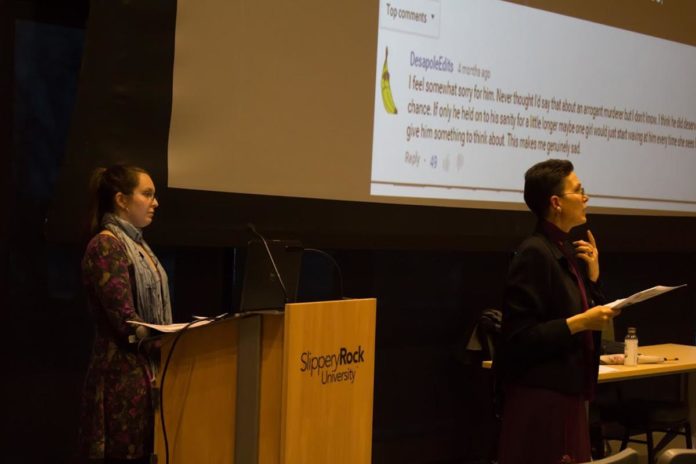Slippery Rock University’s Gender Studies Program hosted a panel, “Masculinity and Mass Shooters,” where SRU students and staff were invited to learn about the correlation between gender and mass shootings and participate in a Q&A.
Professor of English and director of gender studies Cindy LaCom and gender studies graduate assistant Natalie Drozda led the event. The event was co-sponsored by the Department of Criminology and Security Studies and the international psychology honorary, Psi Chi.
“We are doing a disservice to boys and me,” LaCom said. “This is not about apportioning blame, it’s really about raising questions which have to be a part of national conversation.”
LaCom and Drozda informed the audience of statistics on mass shootings and the factors involved that drive males to perform such acts. Past mass shooting tragedies were given as examples, such as the Columbine High School massacre and the case of Elliot Rodger, who was responsible for the Isla Vista killings.
“Being bedded in this research has changed the way I live in the world,” LaCom said.
“I tend to be oblivious and happy and trusting and everyone is wonderful. I have found myself walking into rooms and looking around and thinking, ‘Right now, if I start to hear gun shots, where would I go?’”
Exercise science majors Katelynn Kaiser and Katie Hane attended the event for credit for their psychology course.
“You see (mass shootings) in the media, and then you forget about it because it doesn’t really affect you, but in reality it affects you more than you think it can,” Kaiser said.
Audience member, Sara Bridgeman expressed her feelings about the effect mass shootings and violence have on her.
“I don’t feel safe sitting in this room,” Bridgeman said. “I don’t feel safe anywhere on this university. Every time I go to the movies, and I see somebody sitting alone and they shift, I start to say my goodbyes. That’s how I live. I carry my car keys between my fingers, just in case, and it doesn’t matter if I’m here or anywhere else, that’s just what I’ve had to do to make myself feel even some semblance of safety.“
After attending the informational event and learning about the reality that is mass shooting, Hane was able to walk away with a clear message on how to handle the now normal frequent occurrences of mass shootings.
“(Mass shootings) are a reality and we need to think about it as though it can happen anywhere and anytime, which is kind of scary, but we need to be more aware of it,” Hane said.
Advice was given by Bridgeman for ways to cope with the reality of mass shootings.
“Mass shootings have become such a large issue,” Bridgeman said. “It was just said that some of us may be involved in mass shootings in our lifetime. How are we supposed to live with that hanging over us?”
Drozda was able to supply some advice to Bridgeman on how to cope with the threat of being involved in a mass shooting.
“Mass shootings are very real and terrible,” Drozda said. “The main thing is, you have to go on and live your life. You can’t live in a cage, because that way, you are not being proactive and promoting these tough but necessary conversations. Through dialogue and communication, events like mass shootings can change.”
“Masculinity and Mass Shooters” geared toward bringing awareness to students who may not have known the frequency of mass shootings in America or effects mass shootings can have on society or how gender plays a role in mass shootings, but the hosts were able to share their knowledge with the audience.
“I think there is a capacity for all of us to feel really paranoid and helpless, and I don’t know how to balance that, but I think that finding some way to have a conversation about this violence being a part of our culture without letting it consume us is the best we can do,” LaCom said.







